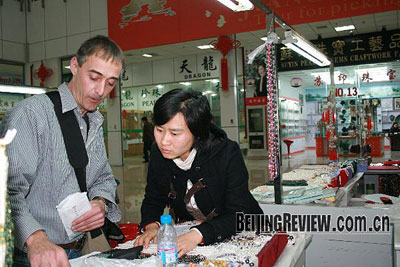| "The history of aquaculture in Wei Tang can be traced back to the end of the 1960s, when fresh water pearl was the pillar income of every family," said Qin Juexian, Deputy General Manager of China Pearl & Gem City, in an exclusive interview with Beijing Review.

The town of Wei Tang is located alongside the Pearl Lake in northern Suzhou, east China's Jiangsu Province. According to Qin, the Wei Tang Pearl Trade Market, the first market of its kind in China, was established as early as in 1984. Traders from home and abroad purchased fresh water pearl here. Wei Tang hence began to be known worldwide as the hometown of Chinese fresh water pearl. In September 2005, China Pearl & Gem City was opened to the public.
"Covering over 37,000 square meters, the city currently has 139 retailer booths and 32 pearl companies, compared to 60 and 15 respectively in the previous market," said Qin. "90 percent of the retailers are locals. Revenue in 2006 was 1.28 billion yuan (approx. $160 million), and that in 2007 is expected to hit 1.38 billion yuan (approx. $184 million)."
Where have all the traders gone?
Zhou Li is a retailer in the city. Hailing from a local peasant family, Zhou graduated from college three years ago and opened a booth with her sister. Their booth is full of various pearl-related products, such as earrings, mobile phone chains, necklaces, etc.
"We maintain a close relationship with traders in the United States and Europe," said Zhou. "So far the business has been good."
"This is the second time in four months I've come to China," Sylvain Birtz, a pearl trader from Montreal, Canada, told Beijing Review. "I was introduced to this place by a friend. The quality is good; the price is good as well. I have no difficulties in communicating with Zhou because she speaks English very fluently."
However, most retailers in the city are not as lucky as Zhou, who can speak English and trade with foreigners. They are local peasants without higher education; they have a lot of experience in breeding and processing pearls but find it hard to come across domestic traders, not to mention foreign ones.
Wu Jianzhen is among them. 44-year-old Wu served in a pearl-processing factory after finishing junior middle school. She retired some five years ago and started a pearl business with her husband.
"Our yearly income is around 20,000 yuan (approximately $2,700), which is higher than in the factory," said Wu. "My customers are mainly introduced to me by relatives and friends. Sometimes foreign traders show interest in my products. But I don't speak English and know nothing about computers, so I just smile when they talk to me. It's a pity, isn't it?"
E-commerce: new solution
The e-commerce website of Wei Tang, launched by the Gems and Jewelry Trade Association of China on December 18, 2007, could remedy Wu's embarrassment.
According to Jia Zhongquan, head of the e-commerce program, the website is part of an e-commerce platform construction initiated by the National Development and Reform Commission.
"In terms of administration, technology and funds, sources will be effectively connected by the Internet," said Jia. "Our final goal is to promote sustainable development for the gems and jewelry trade in China."
In addition, several policies implemented by the government create a favorable and promising environment for e-commerce development. For instance, Opinions on Speeding up the Development of E-commerce, issued by the General Office of the State Council in 2005, and the implementation of the Electronic Signature Law, show how much confidence the Chinese Government has in e-commerce.
"The output of Chinese fresh water pearl accounts for more than 95 percent of the global output," said Jia. "Wei Tang is the origin of the Chinese fresh water pearl. The aquaculture industry here is open to the whole world.
"To this extent, e-commerce will play an important role in connecting domestic and international markets. Moreover, Wei Tang was approved as a national base for gem and jewelry in 2006. The local government intended to introduce a series of pearl-related industries, such as trade, tourism, logistics, etc. It will be harder to realize this goal without the help of e-commerce."
According to Jia, besides Wei Tang there are three branch offices in southeast China's Guangdong Province that will promote e-commerce. A website in Shanghai will be launched soon, and a total of 19 industrial bases nationwide will be connected by the Internet in the near future.
"Communication access will be wider and more convenient," he said confidently.
"We also plan to launch branch offices and websites overseas, such as in Thailand, the United States and the Middle East. It will better serve retailers and companies in the global market." | 